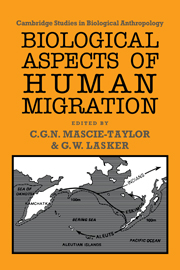Book contents
- Frontmatter
- Contents
- List of contributors
- 1 The framework of migration studies
- 2 Peopling of the continents: Australia and America
- 3 Migration in the recent past: societies with records
- 4 Models of human migration: an inter-island example
- 5 Rural-to-urban migration
- 6 In search of times past: gene flow and invasion in the generation of human diversity
- 7 Migration and adaptation
- 8 Migration and disease
- Glossary
- Index
6 - In search of times past: gene flow and invasion in the generation of human diversity
Published online by Cambridge University Press: 05 March 2012
- Frontmatter
- Contents
- List of contributors
- 1 The framework of migration studies
- 2 Peopling of the continents: Australia and America
- 3 Migration in the recent past: societies with records
- 4 Models of human migration: an inter-island example
- 5 Rural-to-urban migration
- 6 In search of times past: gene flow and invasion in the generation of human diversity
- 7 Migration and adaptation
- 8 Migration and disease
- Glossary
- Index
Summary
For a variety of reasons the human species does not consist of a single interbreeding population. Rather, we are an array of locally interconnected populations (demes) whose social relations with our neighbours include an exchange of mates. Often such an exchange is prescribed, but even when proscribed anthropologists have generally found that an exchange nonetheless occurs.
As mammals we are sensitized to detect morphological variation, and this has without doubt fuelled an age-old interest in explaining the nature of human population differences. Such differences show a variety of generally gradual changes over space. We know that mutation, natural and social selection, and genetic drift are important factors in generating this diversity. However, in the relatively brief period of human history, it is probable that the movement of genes from group to group, over time, has played a major role in the pattern of diversity visible today.
Genes can move from group to group via local mate exchange, or by the expansion of groups from their home ranges, if necessary replacing previous inhabitants of their new territory. Neither of these is clearly conveyed by the term ‘migration’; therefore, in this paper the process of mate exchange will be referred to as ‘gene flow’ and the process of population expansion as ‘invasion’, the latter because the connotation of contested immigration is an important and relevant one.
- Type
- Chapter
- Information
- Biological Aspects of Human Migration , pp. 130 - 166Publisher: Cambridge University PressPrint publication year: 1988
- 15
- Cited by



